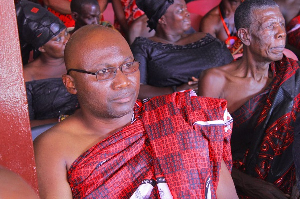Opinions of Thursday, 3 July 2014
Columnist: Tsuo, Cedric
Towards Formulating a Long-term National Development Plan
Ghana’s current social and economic problems--unmanageable deficit, weak cedi, and explosive high unemployment--coupled with perennial acute water shortage and power outage, have once again raised the question as to whether our successive governments have since the overthrow of Dr. Kwame Nkrumah in 1966 been following the right path to national development. There is no shortage of views or prescriptions. Different people in different ways have made different suggestions in the forlorn hope that somebody somewhere in government would be brave enough to initiate a dialogue within the corridors of power.
Naturally, each individual’s prescription for solution is based on his/her own analysis of our problems. From among those individuals there appears to have emerged a group with similar views, a school of thought that generally holds that we cannot avoid the problems we now have unless we revert to long-term national development planning, inspired by thinking and vision. At the risk of being presumptuous, I would include among those individuals the wise elder statesman, Mr. K. B. Asante, (Ghanaweb, 11 June 2014), and Mr. Hassan Ayariga of the People’s National Convention. Mr. Ayariga, for instance, was reported as saying Ghana would not make progress unless it developed a national development plan and implemented it, and as suggesting a 30-year plan (Ghanaweb, 28 May 2014). I also am a disciple of this school, having previously argued a similar position in a piece, titled “Innovative Approach to National Development Planning” (Ghanaweb, 1 January 2011).
It is difficult to believe that after 57 years of self-rule, Ghana cannot today provide such basic human necessities of life as adequate safe drinking water and dependable power supply for its people. Why is that so? Surely, there must be something our successive governments persistently have not been doing right. Yet, today, we hear government officials contriving to put a political gloss on our problems, euphemistically describing them as “challenges” or making apologists’ comments like “Ghana is better than some other countries in the region.”! Such language may sound politically palatable but it won’t change the realities on the ground an iota. Why are government officials so quick to compare Ghana with other countries? Why can’t we set our own high bar and go for it rather than descend to low common denominator? To me, such attitude is a misplaced superiority complex.
I stand to be corrected but I think we have had as many years of military rule as civilian rule. By their nature, our military regimes never took a long-term view of developing the country. In their psyche, they considered themselves as short-term administrators hell-bent on quick-fixing whatever they perceived to be wrong with the civilian or military administrations they took turns to topple. The civilian governments of Dr. Busia and Dr. Limman were cut short by military coups. It would, therefore, be unfair to judge them by the criterion of long-term development planning. That leaves us with our other civilian governments, from Rawlings’ military regimes re-incarnated as civilian governments, followed by John Kufour-Addo governments, then Atta Mills and, finally, to the present government of John Mahama.
I believe Ghana’s social and economic problems today are the result of decades of lack of thinking and vision on the part of our civilian governments and, consequently, their inability to recognize that long-term national development planning, coupled with systematic implementation, was the best way forward for Ghana, which would also ensure optimal or most rational utilization of scarce resources. Instead, they have all engaged in short-term politically expedient programmes, driven mainly by vote-winning and ethnic considerations. From one national election to another our political parties produce glossy rehashed election manifestoes and slogans! But by no stretch of the imagination can one regard election manifestos as development plans. Manifestoes are platitudes, aimed solely at wooing voters. In this context, it is worth recalling the former Minister for Food and Agriculture, Mr. Kwesi Ahwoi’s, damning indictment of our poisonous antagonistic party political culture that allows or tolerates poor implementation by governments of Article 35(7) of the 1992 Constitution, when he lamented that: “often politicians ignore that [provision] in pursuit of their politically parochial and disjointed developmental agenda and abandon very important projects because they are unrestrained by any enforcement mandate” (Ghanaweb, 19 August 2010).
Article 35(7) stipulates that: “As far as practicable, a government shall continue and execute projects and programmes commenced by the previous Governments”. Of course, it must be admitted that that provision itself is weak. Evidently, the framers never intended it to have teeth in the first place. They seem to entrust compliance to the goodwill and integrity of our ministers to make apolitical decisions regarding projects commenced by outgoing governments. Experience has, however, shown that our politicians have no goodwill or integrity to spare. Ghana has a major fundamental problem. Our politics is so polarized, so antagonistic, so divisive, and so petty that the general interests of Ghana and Ghanaians come a distant second to parochial political and ethnic interests. In this climate, a new minister in a new government who has decided for whatever reason not to continue implementation of an existing project could very easily find a million reasons why it is not “practicable” to do so.
Now, the important question is: how do we address Mr. Ahwoi’s fundamentally important concerns? How do we take politics out of our development programmes? Strengthening Article 35(7) through amendment would not be the answer. The problem goes much deeper than the lack of enforcement mechanism. Inserting that mechanism would only make sense if we had a well developed long-term plan. In my opinion, the only way to address the problem is to move away completely from the present practice whereby the political party that comes to power dictates its own programme, based on its own political perspective, with an eye on the next national election. And how do we do that? The answer is that we must make a radical change of course and revert to long-term national development planning, spanning, 25 -30 years, with the participation of the “whole” of Ghana, that is, all registered political parties, regional assemblies, chiefs, educational institutions, civic groups, trade and other unions, cities, villages, and individuals; a plan to which all political parties would undertake to implement if or when they came to power.
Of course, it is important to point out what we need to do to relaunch Ghana on the path of real development planning and implementation. But it is more important to show how we should go about it. So, my view is that if it is to act as engine for propelling Ghana forward and improving the quality of life for all Ghanaians, such plan must meet at least the following four criteria: (a) it must be drawn up in a scientific manner; (b) it must be multi-dimensional; (c) it must be formulated in phases; and (d) it must include specific implementation, verification and assessment tools. A scientifically formulated national development plan must include the following:
(a) Population and Demographic Data Projection
The purpose of a development plan is to “grow” a country for the benefit of all its citizens. Therefore, we cannot successfully plan to develop Ghana and raise the quality of life unless we first know their number, their spatial distribution, their demographic profile, and age-group distribution over the life span of the plan, that is, 25-30 years. This “baseline” study must cover every city, town and village. (This exercise differs entirely from census, which records total population at a given point in time. Census is static, in the sense that it doesn’t tell you the approximate size of population in 5 or 10 years’ time.)
(b) Projection of Social and Economic Needs
Armed with projected population growth and demographic data, we would be in a position also to project fairly accurately their social and economic needs. The situation prevailing in sprawling Accra illustrates my point here. The city must rank as one of the most unplanned, overpopulated, and filthiest cities in Africa, with the possible exception of Lagos. Today, Accra is choking under the sheer weight of its population, worsened by its abysmally inadequate housing, safe drinking water, power supply, drainage, sewage, and waste disposal systems. Accra is appalling in this situation precisely because successive governments have failed to project its population growth and plan ahead accordingly. Long-term national development planning avoids man-made catastrophes like Accra.
The social and economic needs projection for the next 25-30 years for the projected population must include the following: affordable housing; dependable safe water; power supply (including research into the feasibility of solar power as permanent solution to our chronic power supply problem); sewage disposal systems; waste disposal systems; drainage systems; transport systems (roads, railways, water and air); telecommunication systems, (including information technology); health needs, hospitals and clinics, (including specialist or referral centres, equipment, drugs, researches); education at all levels, (including agreement once and for all on the system of education we want, which has become a favourite political football); environmental protection, (including safe-guarding the eco-system and reforestation); climate change; agriculture; fisheries (including restocking the sea, lakes and lagoons); livestock and animal husbandry; jobs and jobs creation (including formal and informal sectors); industries; sports and recreational facilities (within-city gardens and tree planting); sites for future infrastructure; land acquisition; sea erosion; and, manpower needs and development.
(c) Actions to Boost Economic Growth
The plan should also include measures to boost economic growth, create jobs, in co-operation with all key players, both public and private sectors, public and private financial institutions; boosting individual entrepreneurship;, tax system; and innovative ways to enhance the informal sector; strengthening mechanisms for exploiting and use of oil, gas, and mineral resources, tourism, etc.
(d) Putting Institutions in Place
A long-term national development plan in itself may be sound. But it would not deliver anticipated dividends unless there were also in place the right institutions to implement it. The plan should, therefore, take a close look at existing government and other institutions (if necessary create new ones), with a view to strengthening and modernizing them, including introducing or enhancing modern technology for generating, storing retrieving and communicating information.
Who should be Tasked to Undertake the Project?
As we all know, Ghanaian party politics is insanely partisan, buoyed by ethnic undercurrent. That, unfortunately, is the reality. It would, therefore, be imperative to exclude party political influence from the process. A project of this nature and magnitude would require a high intellectual input, practical and impartial approach. So, we would be wise to assign to our universities, specifically the University of Ghana, (lead university), Kwame Nkrumah University of Science and Technology and Cape Coast University. Experts could also be contracted from our private universities and other institutions of higher learning.
Disciplines and other Areas from which to draw Experts
A comprehensive long-term national development plan must consider and reflect every aspect of human life. So, I would suggest the following experts: economists, sociologists, demographers, geographers, statisticians, environmental scientists, city and town planners, educationists, legal experts, medical experts, industrialists, agronomists, bankers, water experts, energy experts, government ministries, etc. In addition, all registered political parties, traditional leaders, trade and all other unions, the Ghana Bar Association, the Armed Forces (protection of Ghana’s land and sea borders), civic societies, and individual Ghanaians, with expertise in any of the relevant fields. In addition, the following bodies could be requested to provide advice or expert input: Ghana’s traditional bilateral donor countries, the World Bank, the IMF, the European Union, UNDP, ILO, and UNHABITAT. It would, course, be left to these universities to determine the modalities for representation, collection and collation of papers and other documents and opinions, and the adoption conference.
Duration and Funding
I am not entirely sure but a project of this size could take up to 5 years to complete, including its formal adoption. The cost of putting such a plan together could run into millions of US dollars. But I just have a feeling that this is the kind of serious development planning project that donors, including the World Bank and UNDP, would consider favourably for funding, especially if it was stipulated that the funds would be channelled directly to the University of Ghana and the three Vice-Chancellors would be joint accounting officers.
Outcome
The outcome of the project should be a full-fledged long-term national development plan, staggered in phases, which all political parties would sign on and pledge to continue to implement whenever they came to power and on which the electorate would judge them at the next national election. The plan should be adopted at a national conference, to be convened specifically for the purpose. As hinted earlier, this proposal is very preliminary. It is just some ideas I have thrown together should any future government decide to revert to long-term national development planning. It would require considerable fine tuning. I believe such a plan is worth a try, if Ghana is to move out of the underdevelopment groove into which it has stuck for decades now. I have little doubt that the overwhelming majority of Ghanaians would support it if a government decided to follow this new path. Otherwise, this paper has no more value than another piece of futile intellectual exercise to amuse only the most curious!
Cedric Tsuo












